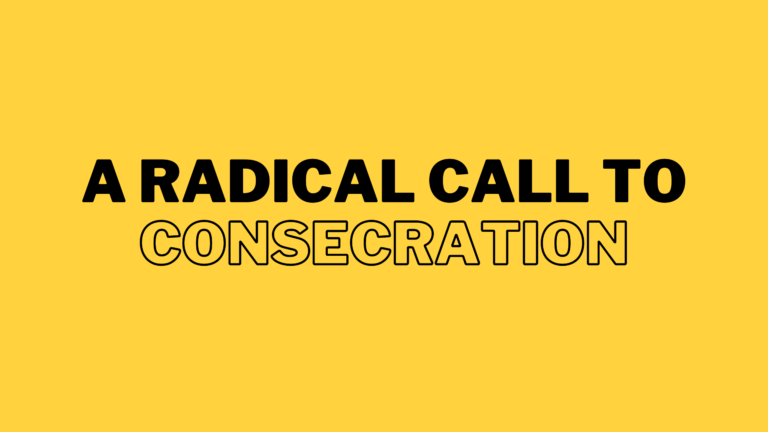Joke: Whats do most religions have do during a recession?– They have to make sacrifices
In the Bible the word consecration means “the separation of oneself from things that are unclean, especially anything that would contaminate one’s relationship with a perfect God.” Consecration also carries the connotation of sanctification, holiness, or purity.
The word consecration isn’t a commonly used word, but even so, we might have an existing concept about what it means. In religion, the word consecration has been used in relation to the official ordaining of a person to be a preacher, a priest, or a missionary. This use implies consecration is for a special category of people
But the consecration revealed in the New Testament is for every believer in Christ. It’s not something only for knowledgeable Christians or spiritually mature ones. In fact, as we’ll see, we cannot subjectively know the life of Christ in us or reach spiritual maturity without consecrating ourselves to the Lord. This is because consecration is the basis for every spiritual experience.
Reflection
- Have we heard the word consecration before?
- How were we introduced to the word? Do we think Christians think about the word enough?
There are two places we can see a clear call to consecration and what it may entail!
OLD TESTAMENT
In the Old Testament, a sacrifice was something set apart for God by being put on the altar. When people offered that thing to God, it no longer belonged to the one offering it. It belonged to God, for His use and His satisfaction.
The importance of being consecrated or pure in our relationship with God is emphasized in an incident in the book of Joshua. After forty years in the wilderness, the children of Israel were about to cross over the Jordan River into the Promised Land. They were then given a command and a promise:
“Joshua told the people, ‘Consecrate yourselves, for tomorrow the LORD will do amazing things among you’” (Joshua 3:5).
Upon consecrating themselves, the children of Israel were assured of God’s promises. The Lord promised that He would do amazing things among them
Just as He opened the Red Sea to deliver them from their Egyptian bondage, He would open the Jordan River and take them into the Promised Land. In fact, this was just the beginning of the miracles God would perform for them in the conquest of the Promised Land. It’s no wonder the psalmist declares, “Your ways, O God, are holy. What god is so great as our God? You are the God who performs miracles; you display your power among the peoples” (Psalm 77:13-14)
Reflection
- What is the connection between those in the old testament consecrating themselves and God doing amazing things with them?
- What is the link between sacrifice and Gods move?
The Old-testament gives us a partial understanding of consecration. When we take a look at the new testament, we get an even clearer picture.
NEW TESTAMENT
Consecration is our giving ourselves to the Lord to become “a living sacrifice,” as Paul says in Romans 12:1: “I exhort you therefore, brothers, through the compassions of God to present your bodies a living sacrifice, holy, well pleasing to God, which is your reasonable service.”
Therefore, I urge you, brothers, in view of God’s mercy, to offer your bodies as living sacrifices, holy and pleasing to God—this is your spiritual act of worship. Do not conform any longer to the pattern of this world, but be transformed by the renewing of your mind. Then you will be able to test and approve what God’s will is—his good, pleasing and perfect will” (Romans 12:1-2).
The Bible tells believers to be a holy people, separate from the world: “Therefore come out from them and be separate, says the Lord. Touch no unclean thing, and I will receive you” (2 Corinthians 6:17).
Today, when we consecrate ourselves to the Lord, we become a living sacrifice. We give up our own claims on ourselves and put ourselves completely in His hands. Previously, our life was for our use and our satisfaction; now it is for His.
When we present ourselves to the Lord as a living sacrifice, we’re simply saying, “Lord Jesus, I am for You. I’m no longer for myself, the world, or anything else. I am for Your use and Your satisfaction.”
Reflection
- How important is it for us to present ourselves to the Lord?
- Does it matter whether we do or don’t?
- What holds us back from doing this? What does a consecrated life look like in Modern Britain?
- What are the benefits of consecration?
If we’re saved, we’ve taken the initial step of our spiritual journey. Thank the Lord for that! But we’ve only just begun. The next step for us is to consecrate ourselves to the Lord. When we do, we’ll be kept in God’s way, grow in His life, allow God to work in us, and enjoy the riches of His full salvation.
Conclusion
Whether we’re newly saved or we’ve been saved for a while, every one of us can give ourselves to the Lord. Even if we never heard of consecration, we can still present ourselves to the Lord right now. He is happy and willing to receive our consecration at any time!


























